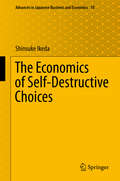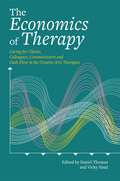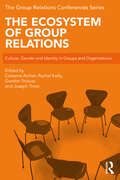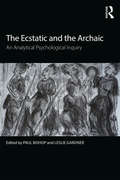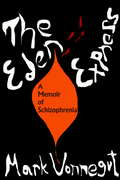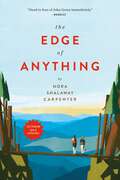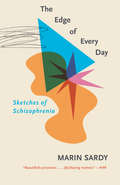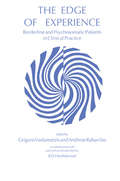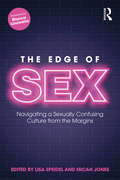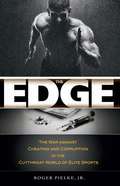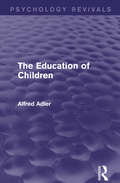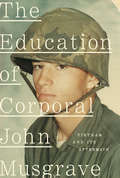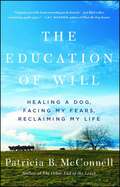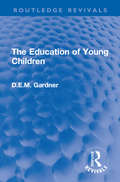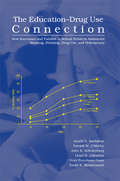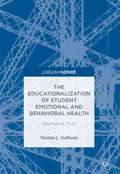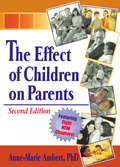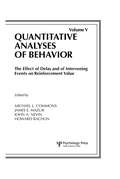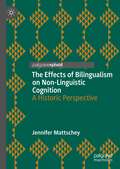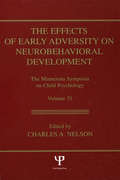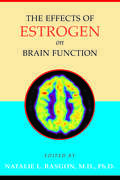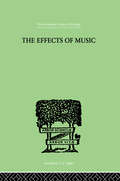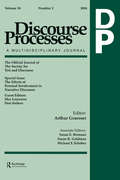- Table View
- List View
The Economics of Self-Destructive Choices
by Shinsuke IkedaBased on recent advances in economics, especially those in behavioral economics, this book elucidates theoretically and empirically the mechanism of time-inconsistent decision making that leads to various forms of self-destructive behavior. The topics include over-eating and obesity, over-spending, over-borrowing, under-saving, procrastination, smoking, gambling, over-drinking, and other intemperate behaviors, all of which relate to serious social problems in advanced countries. In this book, the author attempts to construct a bridge between the basic theory of time discounting, especially as of hyperbolic discounting, and empirically observed "irrational (non-classical)" behavior in the various contexts just mentioned. The empirical validity of the theory is discussed using unique micro data as well as public macro data. The book proposes prescriptions for individual decision makers, whether sophisticated or naïve, to make better choices in self-control problems, and also provides policy makers with useful advice for influencing people's decision making in the right directions. This work is recommended not only to general readers who seek to learn how to attain better self-regulation under self-control problems. It also helps researchers who seek an overview of positive and normative implications of hyperbolic discounting, and thereby reconstruct economic theory for a better understanding of actual human behavior and the resulting economic dynamics .
The Economics of Therapy: Caring for Clients, Colleagues, Commissioners and Cash-Flow in the Creative Arts Therapies
by Brynjulf Stige Stine Lindahl Jacobsen Vicky Abad Alison Ledger Daniel Thomas Elaine Matthews Venter Elena Fitzthum Kingman Chung Monika Geretsegger Petra Kern Rebecca Zarate Thomas StegemannWhen you think of arts therapy, you don't often associate the practice with profit; however, ethical economic models are essential in allowing clients the most access to arts therapy services. Art therapists don't generally have formal training in economics, which can be challenging when developing their professional services. This book offers the fundamentals of micro and macro economics that apply to creating a sustainable and ethical business model that supports the development of the arts therapies profession worldwide. Through economic theory and international case studies, the authors consider the business side of therapeutic arts service with recommendations for developing an ethical and sustainable practice. With key insights and informative examples, this book will serve as a guide for small business owners looking to develop their arts therapy practice.
The Ecosystem of Group Relations: Culture, Gender and Identity in Groups and Organizations (The Group Relations Conferences Series)
by Rachel Kelly Gordon Strauss Joseph Triest Coreene ArcherThe unconscious dynamics that surface in groups when authority is exercised are of paramount importance in Group Relations Conferences; this volume addresses these considerations through research findings and speculation on the future of Group Relations both within conferences and outside of them. This is the sixth instalment in a series of books based on Tavistock Group Relations Conferences and contains a collection of papers presented at the sixth Belgirate conference. Combining chapters on theory and practice, this volume delivers a meditation on the relationships between the physical spaces we inhabit or co-create, the psychic, inner or spiritual space and the liminal space in-between. Group Relations provides a window of understanding into why inequity and intergroup hostilities pervade the modern world alongside a method that illuminates how people consciously and unconsciously contribute to these tensions, whether personally, in groups or in organisations. This will be an invaluable resource for practitioners, academics, and scholars of Group Relations, as well as managers and organisational members wanting to learn more about how Group Relations methods can contribute to their organisational success.
The Ecosystem of the Foreign Language Learner
by Ewa Piechurska-Kuciel Magdalena SzyszkaThis volume examines selected aspects of the foreign language learning process from an ecological perspective, adopting a holistic view on complex interrelations among and within organisms (L2 language learners) and their milieus (family, school and society). First of all, the personal ecosystem of the learner is taken into consideration, whereby two powerful influences are intertwined: cognitive and affective aspects. The learning space formed by the individual is largely shaped by their affective states coexisting in conjunction with their cognitive processes. Moreover, this specific space is also modified by a wider array of other personal ecosystems or those of cultures. Hence, the ecosystem of the foreign language learner is also subject to influences coming from sociocultural leverage that can be represented by people they know, like parents and language teachers, who can both directly and indirectly manipulate their ecosystem. At the same time other important forces, such as culture as a ubiquitous element in the foreign language learning process, also have the power to shape that ecosystem. Accordingly, the book is divided into three parts covering a range of topics related to these basic dimensions of foreign language acquisition (the cognitive, affective and socio-cultural). Part I, Affective Interconnections, focuses on the body of original empirical research into the affective domain of not only L2 language learners but also non-native language teachers. Part II, Cognitive Interconnections, reports on contributions on language learners' linguistic processing and cognitive representations of concepts. The closing part, Socio-cultural Interconnections, provides new insights into language learning processes as they are affected by social and cultural factors.
The Ecstatic and the Archaic: An Analytical Psychological Inquiry
by Leslie Gardner Paul BishopThe word ‘archaic’ derives from the Greek arkhaios, which in turn is related to the word archē, meaning ‘principle’, ‘origin’, or ‘cause’; the notion of ecstasy, or ekstasis, implies standing outside or beyond oneself, a self-transcendence. How these two concepts are articulated and co-implicated constitutes the core question underlying this edited collection, which examines both the present day and antiquity in order to trace the insistent presence of the ecstatic amid the archaic. Presented in three parts, the contributors to this diverse book take the concept of the archaic in an entirely new direction. Part I, 'Ecstasy and the psychological', covers topics including Jung, Freud, ancient psychotherapy, desire, and theatre. Part II, 'Ecstatic-archaic history', considers Ludwig Klages, Orestes and Dionysus. Finally, Part III, 'Ancient ecstatic in other worlds', examines Luo Guanzhong’s Three Kingdoms and Enki at Eridu. The collection offers a distinctive contextualisation of the dimension of the archaic in relation to the ecstatic experience. The Ecstatic and the Archaic will appeal to readers interested in the relationship between ancient and postmodern worlds, and in how the past manifests itself in the present. It will be of great interest to academics and students of Jungian and post-Jungian ideas, classical religions and the history of ideas, as well as practitioners of analytical psychology and psychoanalysis.
The Eden Express
by Mark Vonnegut Kurt VonnegutThe Eden Express describes from the inside Mark Vonnegut's experience in the late '60s and early '70s--a recent college grad; in love; living communally on a farm, with a famous and doting father, cherished dog, and prized jalopy--and then the nervous breakdowns in all their slow-motion intimacy, the taste of mortality and opportunity for humor they provided, and the grim despair they afforded as well. That he emerged to write this funny and true book and then moved on to find the meaningful life that for a while had seemed beyond reach is what ultimately happens in The Eden Express. But the real story here is that throughout his harrowing experience his sense of humor let him see the humanity of what he was going through, and his gift of language let him describe it in such a moving way that others could begin to imagine both its utter ordinariness as well as the madness we all share.
The Edge of Anything
by Nora Shalaway CarpenterStarred Kirkus Review!A vibrant #ownvoices debut YA novel about grief, mental health, and the transformative power of friendship.Len is a loner teen photographer haunted by a past that's stagnated her work and left her terrified she's losing her mind. Sage is a high school volleyball star desperate to find a way around her sudden medical disqualification. Both girls need college scholarships. After a chance encounter, the two develop an unlikely friendship that enables them to begin facing their inner demons.But both Len and Sage are keeping secrets that, left hidden, could cost them everything, maybe even their lives.Set in the North Carolina mountains, this dynamic #ownvoices novel explores grief, mental health, and the transformative power of friendship.
The Edge of Every Day: Sketches of Schizophrenia
by Marin SardyThe debut of an important new literary voice: Marin Sardy's extraordinarily affecting, fiercely intelligent memoir unflinchingly traces the path of the schizophrenia that runs in her family.Against the starkly beautiful backdrop of Anchorage, Alaska, where the author grew up, Marin Sardy weaves a fearless account of the shapeless thief—the schizophrenia—that kept her mother immersed in a world of private delusion and later manifested in her brother, ultimately claiming his life. Composed of exquisite, self-contained chapters that take us through three generations of this adventurous, artistic, and often haunted family, The Edge of Every Day draws in topics from neuroscience and evolution to the mythology and art rock to shape its brilliant inquiry into how the mind works. In the process, Sardy casts new light on the treatment of the mentally ill in our society. Through it all runs her blazing compassion and relentless curiosity, as her meditations takes us to the very edge of love and loss—and invite us to look at what comes after.
The Edge of Experience: Borderline and Psychosomatic Patients in Clinical Practice
by Grigoris Vaslamatzis Andreas RabavilasThis book deals with problems related to the analysis and treatment of borderline and psychosomatic patients. It demonstrates how psychoanalytic practice has had to accomodate the range of "borderline syndromes" and produce new models of theory and treatment.
The Edge of Sex: Navigating a Sexually Confusing Culture from the Margins
by Lisa Speidel Micah JonesThe Edge of Sex is an anthology of voices from the margins, bringing together 37 writers to discuss their experiences of sex and sex education in America. The anthology explores often overlooked and excluded identities, with pieces on sexuality and disabilities, survivors of assault, sex work as women of color, kink and BDSM, being Muslim and queer, reproductive rights, and the challenges of culture and identity when grappling with gender fluidity and gendered expectations. As they trace the negative effects of a restrictive, fear-based sex education – particularly on marginalized individuals – these stories unearth larger themes: tensions with race and religion, expectations from heteronormative society, and pressures of femininity and masculinity. Importantly, they also highlight the resilience and empowerment of marginalized individuals within a culture designed to ostracize them. The rich, diverse, and intersectional stories of The Edge of Sex paint a contextualized picture of sex education and make an urgent case for better representation and more inclusive, consistent, and comprehensive content. By reading this anthology, casual readers may learn more about their sexual selves, clinicians can apply the material to their practices with clients, and educators and students can expand their knowledge of feminist theory, intersectional theory, queer theory, and sex education.
The Edge: The War against Cheating and Corruption in the Cutthroat World of Elite Sports
by Simon Kuper Roger PielkeRoger Pielke reveals how sports stars break the rules in their search for a competitive edge.Both entertaining and thought-provoking, THE EDGE not only visits the battlefields in the war against cheating and corruption, but also explores ways to ensure that "the spirit of sport" can survive in today's high-tech, highly professional world.Drawing on controversies straight out of the headlines, Pielke looks at doping, match fixing, fake amateurism, and other ways of breaking the rules. But are those rules--and the values they reflect--hopelessly outdated?Wonderfully readable and scrupulously researched, THE EDGE blends science and journalism to produce an unforgettable account of sport in crisis.
The Education of Children Under Seven (Routledge Library Editions: Education)
by Mary SturtThis book does not cover the whole field of Infants’ Teaching but is concerned mainly with general principles and matters which are open to the non-specialist. Some technical subjects such as Physical Education have been omitted but nonetheless the volume provides a thorough (if somewhat dated) introduction to early years education in the first half of the twentieth century.
The Education of Children: Individual Psychology In The Schools And The Education Of Children: Education For Prevention (Psychology Revivals)
by Alfred AdlerOriginally published in 1930, this title looks at the education of children. Adler believes the problems from a psychological point of view are the same as for adults, that of self-knowledge and rational self-direction. However, the difference being that due to the ‘immaturity of children, the question of guidance – never wholly absent in the case of adults – takes on supreme importance.’ The title starts by presenting the Individual Psychology viewpoint as a whole, with the later chapters undertaking to tackle in more depth the various interrelated problems of children’s education.
The Education of Corporal John Musgrave: Vietnam and Its Aftermath
by John MusgraveA Marine's searing and intimate story—"A passionate, fascinating, and deeply humane memoir of both war and of the hard work of citizenship and healing in war&’s aftermath. A superb addition to our understanding of the Vietnam War, and of its lessons&” (Phil Klay, author of Redeployment).John Musgrave had a small-town midwestern childhood that embodied the idealized postwar America. Service, patriotism, faith, and civic pride were the values that guided his family and community, and like nearly all the boys he knew, Musgrave grew up looking forward to the day when he could enlist to serve his country as his father had done. There was no question in Musgrave&’s mind: He was going to join the legendary Marine Corps as soon as he was eligible. In February of 1966, at age seventeen, during his senior year in high school, and with the Vietnam War already raging, he walked down to the local recruiting station, signed up, and set off for three years that would permanently reshape his life.In this electrifying memoir, he renders his wartime experience with a powerful intimacy and immediacy: from the rude awakening of boot camp, to daily life in the Vietnam jungle, to a chest injury that very nearly killed him. Musgrave also vividly describes the difficulty of returning home to a society rife with antiwar sentiment, his own survivor's guilt, and the slow realization that he and his fellow veterans had been betrayed by the government they served. And he recounts how, ultimately, he found peace among his fellow veterans working to end the war. Musgrave writes honestly about his struggle to balance his deep love for the Marine Corps against his responsibility as a citizen to protect the very troops asked to protect America at all costs. Fiercely perceptive and candid, The Education of Corporal John Musgrave is one of the most powerful memoirs to emerge from the war.
The Education of Will: Healing a Dog, Facing My Fears, Reclaiming My Life
by Patricia B. McConnellBestselling author and internationally renowned animal psychologist and dog trainer Patricia McConnell &“gives a voice to those who can&’t speak in words and provides hope for fearful animals everywhere&” (Temple Grandin) in this powerful and uplifting memoir about healing.World-renowned as a source of science and soul, Patricia McConnell combines brilliant insights into canine behavior with heartwarming stories of her own dogs and their life on the farm. Now, she reveals that it wasn&’t just the dogs who had serious problems. For decades Dr. McConnell secretly grappled with her own guilt and fear, which were rooted in the harrowing traumas of her youth. Patricia is forced to face her past by her love for a young Border Collie named Will, whose frequent, unpredictable outbreaks of fear and fury shake Patricia to her core. In order to save Will from this dangerous behavior, she must find her own will to heal, and along the way learn that will power by itself is not enough. Interweaving enlightening stories of her clients&’ dogs with tales of her deepening bond with Will, this is a &“compassionate account of the reclamation of the author's life from abuse and shame. An uplifting story of hope about how both dogs and humans need "a sense that they are not helpless victims" (Kirkus Reviews).
The Education of Young Children (Routledge Revivals)
by D.E.M. GardnerFirst published in 1956, The Education of Young Children is focused on presenting the psychological needs of children within education, following several talks given by the author at conferences for teachers of young children. The book highlights the importance of meeting all aspects of a child’s needs. It demonstrates that physical, emotional, social, and intellectual needs are all intrinsically connected and fundamental to education and development. It also puts forward the significance of Nursery Schools and the training given to Nursery School teachers, as well as the influence of Nursery Schools on Infant Schools. The Education of Young Children will appeal to those with an interest in the history and psychology of education.
The Education-Drug Use Connection: How Successes and Failures in School Relate to Adolescent Smoking, Drinking, Drug Use, and Delinquency
by Jerald G. Bachman Patrick M. O'Malley John E. Schulenberg Lloyd D. Johnston Peter Freedman-Doan Emily E. MessersmithDoes success in school protect teenagers from drug use? Does drug use impair scholastic success? This book tackles a key issue in adolescent development and health - the education-drug use connection. The authors examine the links and likely causal connections between educational experiences, delinquent behavior, and adolescent use of tobacco, alco
The Educationalization of Student Emotional and Behavioral Health: Alternative Truth
by Teresa L. SullivanThis book examines the current political, social, and economic positions that push the responsibility for the emotional health of students onto schools. The context of recent education reform asks schools to mitigate adverse emotional health of students by developing and implementing broad programming, curriculum, and policies immersed in cognitive behavioral approaches. The design plan is intended to build resilience and develop strategies in students that will enable them to succeed despite adverse structural conditions. The swindle of education reform is that it deflects and blames families, youth, and the school system for the social ills of society. From the perspective of a thirty year Massachusetts educator and high school principal emerges an alternative reality that not only challenges decades of education reform entrenched in victim blaming but also exposes a serious responsibility gap.
The Effect of Children on Parents
by Anne Marie AmbertRecognize the hidden costs and rewards of childrearing!The Effect of Children on Parents, Second Edition, thoughtfully explores the interactions by which parents and children change, develop, and sometimes affect each other negatively. Everyone knows that parents influence their children, but few people consider the ways in which children affect their parents. The love, satisfaction, and fulfillment children offer can change parents’lives. So can the stress, worry, and financial drain. The Effect of Children on Parents, Second Edition, honestly confronts these long-neglected issues of family dynamics. Taking a unique interdisciplinary approach, this book describes in great detail, with jargon-free language the various aspects of children's effects on their parents. This second edition contains an abundance of fresh information, including nine entirely new chapters that deal with such complex topics as the effects on parents of children with emotional, behavioral, and delinquency problems. The Effect of Children on Parents, Second Edition, asks and answers essential questions on the parent-child dynamic, including: what role does genetic inheritance play in children's responses to their parents? how do peers influence children and through them, their parents? what happens to parents when children are difficult or have emotional problems? what special considerations apply to minority or adoptive parents? how do adult childrem affect their aging parents? how does society support or undermine parents? what roadblocks prevent parents from being as effective as they would like to be?The Effect of Children on Parents, Second Edition, takes a brave look at this often ignored area of family dynamics, giving a richer, more complex, and ultimately more healing view of how humans interact in families. Professors, students, and experts in the fields of child development, family studies, and sociology of childhood and family will find this book a sophisticated tool in their desire to better understand and help families and children.
The Effect of Delay and of Intervening Events on Reinforcement Value: Quantitative Analyses of Behavior, Volume V (Quantitative Analyses of Behavior Series)
by James E. Mazur Michael L. Commons John A. Nevin Howard RachlinFirst published in 1986. This is Volume V of six in a series on Quantitative Analyses of Behavior. Quantitative analysis now generally refers to the fact that theoretical issues are represented by quantitative models. An analysis is not a matter of fitting arbitrary functions to data points. The volumes in the present series have been written for behavioral scientists. Those concerned with issues in the study of how behavior is acquired and then allocated in various environments-biologists, psychologists, economists, anthropologists, and other researchers, as well as graduate students and advanced undergraduates in those areas-should find volumes in this series to be state-of the-art readers and reference works. Each volume of the series examines a particular topic that has been discussed at the annual Symposium on Quantitative Analyses of Behavior held at Harvard University. This volume, V, addresses the topic of how reinforcement value is affected by delay and intervening events. Self-control studies are also presented and discussed.
The Effects of Bilingualism on Non-Linguistic Cognition: A Historic Perspective
by Jennifer MattscheyThis book examines a century of research on the relationship between bilingualism and intelligence and relates it to more recent research on bilingualism and executive functioning. In doing so, it highlights how bilingualism research has been understood and used by wider society and its impact on current debates in cognitive science as well as language policy and education. The book probes the correlation between the fact that while early intelligence research suggested a negative effect of bilingualism on intelligence, the so-called “Bilingual Problem”, later research implied a positive effect, “the Bilingual Advantage.” It questions whether the negative consequences that arose from the Bilingual Problem are influencing researchers’ reluctance to let go of the Bilingual Advantage. Findings on both the bilingual ‘advantage’ and ‘disadvantage’ are shown to have suffered from similar methodological problems, with research into the former finding itself at the centre of the ongoing replication crisis in psychology. This book provides fresh insights that will be of particular interest to students and scholars of cognitive psychology, psycholinguistics, bilingualism, applied linguistics, education and the history of science.
The Effects of Early Adversity on Neurobehavioral Development (Minnesota Symposia on Child Psychology Series #Vol. 31)
by Charles A. NelsonThere has been a burgeoning of interest in the relation between biological development--particularly brain development--and behavioral development. This shift in focus does a better job of reflecting the whole child and all of development. Not surprisingly, many of the individuals who are concerned with the theoretical side of brain-behavior relations are also concerned with the more practical side. The chapters that comprise this 31st volume of the Minnesota Symposium series collectively capture the subtle dance between the biological and behavioral aspects of early adversity as it influences neurobehavioral development. Individuals interested in this volume represent the disciplines of developmental psychology and psychopathology, child psychiatry, toxicology, developmental and behavioral pediatrics, behavioral neurology, and special education.
The Effects of Estrogen on Brain Function
by Natalie L RasgonThis timely volume reviews current data on the effects of estrogen on the central nervous system, highlighting clinical aspects of this topic. Experts from the fields of psychiatry, pharmacology, neurology, and geriatrics collaborate to clarify the known risks and benefits of hormone therapy and explore questions that remain to be elucidated.Among the topics discussed:" Preclinical data on estrogen's effects on cognitive performance" The short-lived effects of hormone replacement therapy on cognitive function" Structural and functional brain imaging data regardingestrogen's effects on the central nervous system " Preclinical efforts to develop effective NeuroSERMs for the brain " The effects of estrogen on moodCiting the ongoing confusion over the risks and benefits of estrogen therapy, the contributors emphasize the need for additional research on medication, doses, preparations, methods of administration, alternative therapies, and supplements. This volume educates researchers, clinicians, and students on the current knowledge—including the effects of estrogen on mood, cognition, and brain metabolism—and provides guidelines for clinical practice and future research.Contributors: Roberta Diaz Brinton, Ph.D., University of Southern California; Cheri L. Geist, B.A., David Geffen School of Medicine, University of California at Los Angeles; Robert B. Gibbs, Ph.D., University of Pittsburgh School of Pharmacy; Eva Hogervorst, Ph.D., University of Loughborough and University of Oxford; Pauline M. Maki, Ph.D., Neuropsychiatric Institute, University of Illinois–Chicago; Peter J. Schmidt, M.D., National Institute of Mental Health; Daniel H. S. Silverman, M.D., Ph.D., David Geffen School of Medicine, University of California at Los Angeles; Katherine E. Williams, M.D., Stanford University School of Medicine; Kristine Yaffe, M.D., University of California, San Francisco, and San Francisco VA Medical Center; Laurel N. Zappert, B.A., Stanford University School of Medicine; Liqin Zhao, Ph.D., University of Southern California
The Effects of Music: A series of Essays (International Library Of Psychology Ser.)
by Max SchoenThis is Volume XVIII of twenty-one of collection of works on Cognitive Psychology. Initially published in 1927 it offers a collection of essays on the effects of music on the listerner.The book is at once a response and a challenge. It is a response to the inquiry which any thoughtful listener makes, “ What is this music doing to me ? ” A t the same time it is a challenge to science to explain more adequately than has as yet been done the nature and the mysteries of musical effects.
The Effects of Personal Involvement in Narrative Discourse: A Special Issue of Discourse Processes
by Arthur GrasserOver the last several decades, the study of discourse processes has moved from the complementary efforts characteristic of multidisciplinary research, to the explicitly integrative focus of interdisciplinary research. Some organizations have supported the methodological and conceptual merger of areas like literary studies, psychology, linguistics, and education. As evident in this special issue, research concerning personal involvement in narrative discourse has benefited from these developments. The five studies supported in this issue examine a range of potential determinants of personal involvement in narrative discourse. These include overt verbalization of thoughts and feelings, foregrounding, preference for genre and protagonists, relevance of the content of a text to the reader, and identifying with a character. These studies also examine different aspects of what is absorbed by the reader, including sophisticated forms of questioning, lasting appreciation of story points, involvement with story characters, commitment to story-consistent beliefs, and changes in the sense of self. Collectively, these studies challenge the conception of what it means to understand media presentations of fictional narratives as well as the conception of the strategies through which such understanding is attained.
